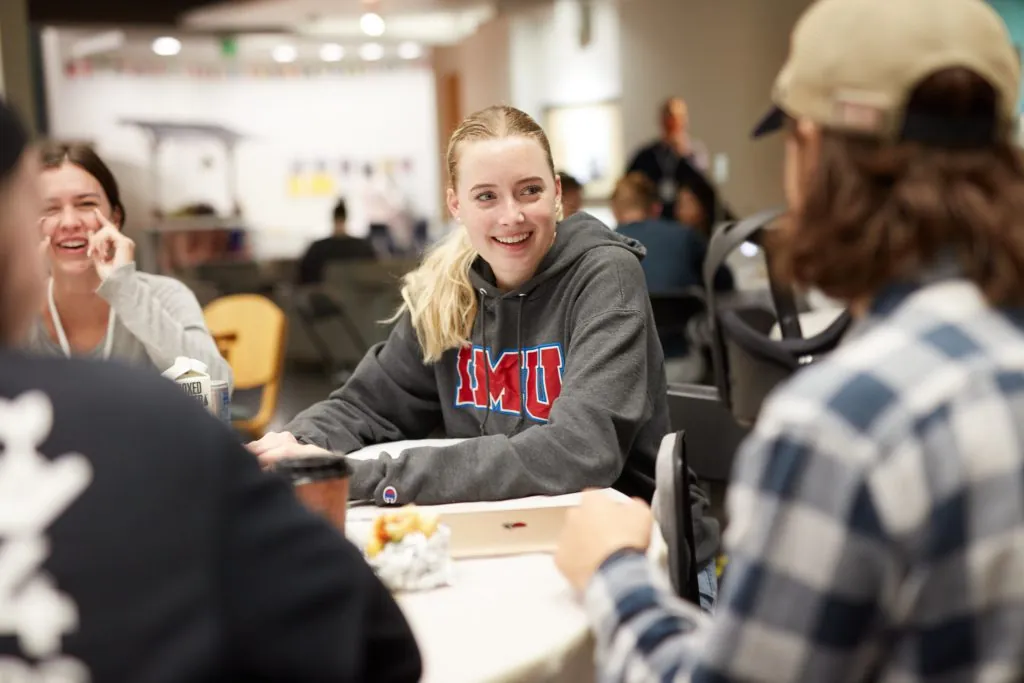
Located in sunny Los Angeles, students at Loyola Marymount University stroll down Palm Walk between classes. LMU’s College of Business Administration undergrad population has grown 50% in the last five years. Courtesy photo
Loyola Marymount University College of Business Administration
Loyola Marymount University made a big splash in our 2024 ranking of the Best Undergrad Business School programs, debuting in our annual list at No. 39. That’s the highest debut ranking of the year.
With thousands of business schools in the United States alone, we admittedly haven’t poured a lot of ink on LMU’s College of Business Administration. We should have paid more attention.
According to Josh Spizman, associate dean of faculty and academic programs, the undergrad population in LMU’s business program has grown an impressive 50% over the last five years. To accommodate, the college has launched an almost dizzying amount of new programs.
That includes a new business core curriculum in the fall of 2020 to align with its mission: “To advance knowledge and develop business leaders with moral courage and creative confidence to be a force for good in the global community.” The Class of 2024 will be the first to graduate under this curriculum this coming May.
It also launched a new Real Estate Certificate Program in 2022 and an Entrepreneurship Certificate just this year. This fall, it will launch a Master in Entertainment Leadership and Management, a joint program with its School of Film and Television, offering a 4+1 option for undergrads to earn their bachelor’s and master’s in five years.
So, LMU, you caught our attention. We’ll be watching.
P&Q INTERVIEW WITH JOSH SPIZMAN
We asked Josh Spizman, associate dean of faculty and academic programs, what makes Loyola Business special. Our Q&A is below.
What are recent and upcoming program developments and innovations that will enhance the experience of future students?
Over the past five years, the undergraduate student population in the College of Business Administration (CBA) has grown by about 50%. We launched a new business core curriculum in fall 2020 that aligned with our mission: to advance knowledge and develop business leaders with moral courage and creative confidence to be a force for good in the global community. The first group of students under this curriculum will graduate in May 2024.

Josh Spizman
To support this growth, we continue to expand our student engagement through student organizations. We now have 16 student organizations supported by the college which deliver over 100 events per academic year. We track student engagement through an innovative program called CBA Advantage, powered by an app called Suitable. For each activity, there is an opportunity to track and reflect on key tenets of our mission: business knowledge; leadership skills; moral courage; creative confidence (entrepreneurial mindset); and global citizenship. Students complete engagement activities over their four-year experience, earning points for each completion. This is a requirement for graduation.
Asynchronous activities, such as Bloomberg Market Concepts and Bloomberg ESG certificates, are part of CBA Advantage as well as internship experiences, competitions, and more! The app provides each student with an e-portfolio capturing a record of engagement, reflections, and preparatory material for career development and interviews.
In 2022, we launched a Real Estate Certificate Program taught and delivered by our real estate executive board advisory members. In 2024, we launched a similar program, an Entrepreneurship Certificate, that is developed and taught by faculty and entrepreneurs, highlighting the power that an entrepreneurial mindset can bring to any discipline. Both programs provide opportunities to earn “stackable credentials” at no cost and enrollment is open to all students across the university.
In 2026, LMU College of Business Administration will celebrate 100 years of business education, and event planning around this significant milestone is underway.
Any other notable news coming for 2024 that readers should know?
This fall, we are launching a Master in Entertainment Leadership and Management, a joint program with our School of Film and Television that focuses on the entertainment industry and can be completed in one year. We have seen increased demand to learn about this industry from our undergraduate business students, partly based on data about the type of co-curricular activities that our students are participating in, so we are offering a 4+1 option for our students to continue their education in this field.

An LMU student works in the Bloomberg Finance Learning Lab. Courtesy photo
What are your program’s two biggest differentiators from other top undergraduate business programs? How do these prepare students for their careers?
At CBA, we have four Centers for Excellence that provide additional engagement opportunities for our students, which range from programming to competitions to study abroad opportunities and much more. These centers allow students to explore themes or areas that supplement their chosen discipline.
One center to highlight is our Institute for Business Ethics and Sustainability (IBES), which focuses on advancing the United Nations Sustainable Development Goals (SDGs) through education, research, programs, and partnerships. The college itself is a signatory to the UN’s Principles for Responsible Management Education (PRME) and IBES holds us accountable to weave SDGs throughout our curriculum and the student experience. IBES also organizes the annual International Business Ethics and Sustainability Case Competition. This event provides a great opportunity for our students to not only participate as part of their “Business Ethics and Sustainability” senior-level required business class but also learn alongside students from around the world as they work together to find solutions to address the SDGs. Every two years, CBA shares its commitment to PRME through our “Sharing Information on Progress” report, which details how our college (and the university) are actively working to address some of the world’s toughest challenges.
All of this would not be possible without the close relationship that our students have with our faculty, our second key differentiator. LMU prides itself on its small class sizes and its impressive student-to-faculty ratio of 11:1. Maintaining small classes below 30 enables students to intentionally engage with their peers and faculty. Our faculty are actively engaged in the student experience (no class is taught by graduate students), allowing authentic relationships to develop from mentoring to coaching to advising.
Faculty can often be seen mentoring students on business research or career development, and have even co-written papers, presented at conferences, and taken on other collaborative projects with students. Many of our faculty take active roles in supporting students in intercollegiate competitions.
In the past few years, our students have been successful in competitions such as the Effie Collegiate Brand Challenge, UCLA Bruin Tank Pitch Competition, and the Deloitte Audit Innovation Challenge, to name a few. Close relationships with faculty prepare our students for careers by developing their creative confidence, leadership, and strong analytical skill sets. Opportunities to develop networking and communication skills are an additional benefit.
What separates your graduates from other business school graduates?
Our students receive an education rooted in the Jesuit philosophy of educating the whole person and grounded in a strong liberal arts core curriculum. Our graduates learn that business can be a force for good in the world.
To set them on this path early, all business students take a first-year course, “Business for Good,” where they develop a business plan for a product or service that emphasizes the relationship between societal impact and running a viable business. This approach ensures that all students understand a triple bottom line perspective and can evaluate business scenarios from a “bottom-up” lens. As a result, students are equipped to weave this perspective throughout their entire business curriculum and in their professional lives. This course recently won a Financial Times Responsible Business Education award for innovative teaching.
Explain the career services, programming, and extracurriculars that give your students an advantage in career outcomes?
LMU students have access to a centralized Career and Professional Development office that organizes various events such as panels, hosts job and internship fairs, and provides one-on-one coaching and resume review, in addition to making sure students have access to cutting-edge technologies to help with their job search. CBA also has an embedded career coach for students.
Many of our departments provide area-specific career programming. For example, the finance department started a remote job shadowing program during the COVID pandemic, which is a way for students to learn about various careers during the summer, even while holding an internship. Many of our student organizations also hold recruiting events throughout the academic year and our centers for excellence provide company site visits as well. Our various advisory boards provide additional opportunities for students to network and receive one-on-one coaching.
Given these opportunities, CBA Advantage ensures that students develop knowledge, skills, and competencies uniquely linked to our mission, which helps differentiate them in the job market.

Business students participate in LMU Startup Weekend. The college has 16 student organizers which organize 100 events per year aimed at a variety of interests. Courtesy photo
When alumni look back on their time in your undergraduate business program, what would they consider to be their signature experience?
One of our key beliefs is students should have the opportunity to make the experience what they want. Throughout their time at LMU as an undergraduate student, we hope students will have many memorable moments.
For some, it may be taking part in a national case competition, for others, it might be a speaker event where an executive spoke about a topic that resonated. Some students may look back on their time as a student leader in one of our student organizations and others may consider taking part in our Student Investment Fund to be their signature experience. Perhaps a student will look back and their most memorable moment was being introduced to an alumnus who became a mentor, friend, and maybe even a colleague.
Our job as leaders and educators is to provide a diverse array of opportunities and empower students to create their own signature experiences, and at CBA, we strive to do that every day.
What is the most underrated feature of your undergraduate business program and how does it enhance the experience for your business majors?

An LMU student takes in the beautiful campus views. Courtesy photo
CBA Advantage: a requirement for graduation that connects a student’s co-curricular experiences as an undergraduate to an app on their phone where students earn points in a gamified fashion. As a student engages and develops out-of-classroom experiences over their time in CBA, the app provides a space for students to track and reflect on their many experiences. Students also earn points for participating in activities and this feature provides a competitive way for students to engage.
Activities in CBA Advantage can include in-person opportunities such as guest speakers, competitions, club meetings, resume workshops, on-campus work, as well as off-campus experiences such as internships, part-time jobs, business-related certifications, study abroad, and more! The contents of the app serve as a data repository for students to use (and is accessible even after they graduate) as they build their resumes, prepare for interviews, examine cover letters, etc.
This toolkit serves as a resource for students as they transition to becoming young professionals in developing a narrative that articulates how their undergraduate experience has prepared them to be the best candidates for a job.
Which employers are the biggest consumers of your undergraduate talent and what have they told you about your alumni that make them so special?
Over the past few years, some of the biggest employers of our undergraduate business students are Deloitte, EY, JP Morgan Chase, NBC Universal, Nike, Northrup Grumman, PwC, Raytheon, and Walt Disney.
Graduates work at countless other firms and many even start their own companies. A common theme we hear from employers is that LMU students are caring, concerned with the greater good, and focused and passionate about creating social impact.
What else would you like readers to know about your program?
The opportunities to network and engage with some of the largest companies in the world are endless when you consider the location, size, and faculty of LMU CBA. Just below “the bluff” of LMU is Playa Vista, which houses a rich ecosystem of companies such as Google, Meta, Verizon, YouTube, and Belkin. From course projects to internships to company visits, CBA students have access to learn from some of the best. Additionally, we have developed advisory boards of alumni and friends of the school for each of the disciplinary areas. These board members serve as mentors and coaches/judges for competitions, and provide valuable business insights at end-of-semester presentations. The boards also work with faculty to ensure our curriculum stays current and cutting edge.
NEXT PAGE: UNC Kenan-Flagler Business School











Questions about this article? Email us or leave a comment below.